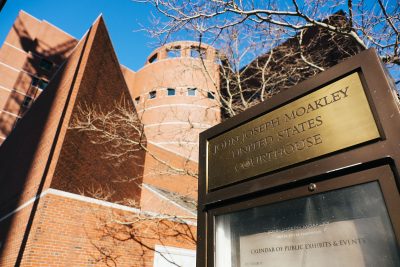
Approximately 20 people gathered at the John Joseph Moakley United States Courthouse Wednesday afternoon to show support for Mary Holmes in her case against the Massachusetts Bay Transportation Authority and MBTA Police Officer Jennifer Garvey.
Holmes, a Roxbury resident, filed a lawsuit last August in response to alleged instances of brutality against her and another woman committed by two MBTA police officers, Garvey and Officer Alfred Trinh, according to the ACLU’s official description of the case.
Holmes witnessed Officer Garvey verbally and physically mistreat another black woman in March 2014. When Holmes attempted to report the incident by dialing 911, the two officers “pepper-sprayed Ms. Holmes in the face, beat her with a metal baton, and arrested her,” according to the ACLU’s description.
Half of the courtroom’s attendees were there as part of the Mass Action Against Police Brutality event “Pack the Courtroom! Justice for Mary Holmes!”
“MAAPB salutes Ms. Mary Holmes for her resilience and steadfast fight back against the actions of the Transit Police Department and the Suffolk County District Attorney,” read the event’s description. “… We stand in firm solidarity with Ms. Holmes, and all victims of police brutality.”
The main purpose of the court hearing was to determine if the MBTA should be removed from the case due to sovereign immunity, according to Jessie Rossman, a staff attorney for the ACLU of Massachusetts who was present at the hearing.
Three lawyers comprised the MBTA’s defense team. Of the three, Mike Ricciuti was the only one to speak at the hearing.
Ricciuti argued that the new addition of the MBTA as a defendant, in April 2016, is without standing due to the sovereign immunity they have as a part of the state.
Sovereign immunity is defined as “the idea that the sovereign or government is immune from lawsuits or other legal actions except when it consents to them,” according to Cornell University Law School’s Wex Legal Dictionary.
“As we stand here today, the MBTA is an arm of the state,” Ricciuti said. “It’s at best a negligence case. The MBTA should be dismissed.”
Rossman argued that sovereign immunity does not apply to this case. As evident in previous cases regarding handling of MBTA debts, the state does not consider the MBTA as an entity able to claim sovereign immunity, according to Rossman.
“Under the case law, [the MBTA] aren’t protected by that immunity,” Rossman told The Daily Free Press after the hearing. “The state didn’t intend for the immunity to cover that.”
Rossman said the MBTA should be held responsible for its lack of response to the incident. She also referenced several other similar instances that would be affected by the court’s decision in this case.
“The commonwealth hasn’t changed its name. It’s still the MBTA,” Rossman said when she spoke at the hearing, emphasizing the letter “A” in the acronym MBTA. “It has the authority necessary to make changes and enforcements.”
Howard Friedman, one of the attorneys representing Holmes, explained the reasoning behind the recent addition of the MBTA as a defendant when he spoke at the hearing.
Previously, the only defendant was the police officer who was charged with a crime. This addition of the MBTA strengthens the case, according to Friedman.
“We didn’t add everyone and their mother into our case. Instead, we sued the MBTA,” he said during the hearing. “It made sense to add a second entity.”
Esther Leonard, 28, of Revere, who attended the event as part of Mass Action Against Police Brutality’s event, said the relatively low attendance could be due to the fact that the hearing was rescheduled three times.
“This was postponed a few times,” Leonard said, “and I saw I could make it today.”
Leonard went on and said while she does not have any direct experience with police brutality, the experiences of friends and others across America prompted her to attend the hearing.
“I was at a march [for Michael Brown] in August, so that’s how I heard about this,” she said. “That’s why I’m here to show support [for Holmes].”





















































































































